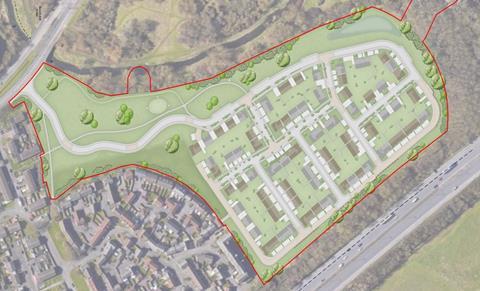The development will be 100% affordable
Solihull Council has selected housebuilder Vistry Group as the development partner for a 177-home scheme which will be designated as 100% affordable.

The homes will be built using modern methods of construction (MMC) with open panel timber frames from the Vistry Works, its timber frame manufacturing plant just outside Leicester in the East Midlands.
According to the housebuilder, homes built with these panels produce 14,460 kg less in CO2 emissions, which is roughly equal to taking three cars off the road for a year.
It also said they would make the homes highly energy efficient, helping residents to save on energy bills.
They will also be fitted with heat pumps and solar panels.
>> See also: Oxford City Council set to approve 184-home deal with Vistry
>> See also: Vistry set to unseat Barratt as country’s biggest housebuilder
The scheme will also receive £3m in investment from the West Midlands Combined Authority, which Vistry and Solihull Council have said will go towards building infrastructure, including cycle lanes and footpaths.
The 177 homes will be built on the site of a former Simon Digby School in Chelmsley Wood, which is located to the east of Birmingham.
To meet local housing need, the development will provide a mixture of one-bed maisonettes and two-, three- and four-bedroom family homes.
Councillor Mark Parker, cabinet member for housing, said: “Here in Solihull, we’re serious about stepping up to the challenge of building the new homes our residents need while also setting the highest quality threshold for energy efficiency and sustainability.”
Parker continued: “Once built, the scheme will deliver a biodiversity net gain through key design features such as green landscaping and a dedicated new nature trail.”
Richard Parker, West Midlands mayor, said: “We have to start building more homes that local people can genuinely afford.
“Working together, including a £3 million contribution from the WMCA, all 177 houses on this site are planned to be affordable meaning more homes for all communities across the region”.
Parker added that “schemes like this one that use low carbon, factory-built homes are revolutionising the housing landscape. They are quicker to build and easier and cheaper to heat, which means they can make a big difference in addressing the housing crisis.”
James Warrington, divisional chair for South Midlands and the North at Vistry said that Vistry is “thrilled” to be working with Solihull Council on the development.
He added: “We’re excited to be a part of Solihull’s growth and to be entrusted with the build of these much-needed new homes which will contribute to the character of the area and create a thriving and sustainable community.”










No comments yet